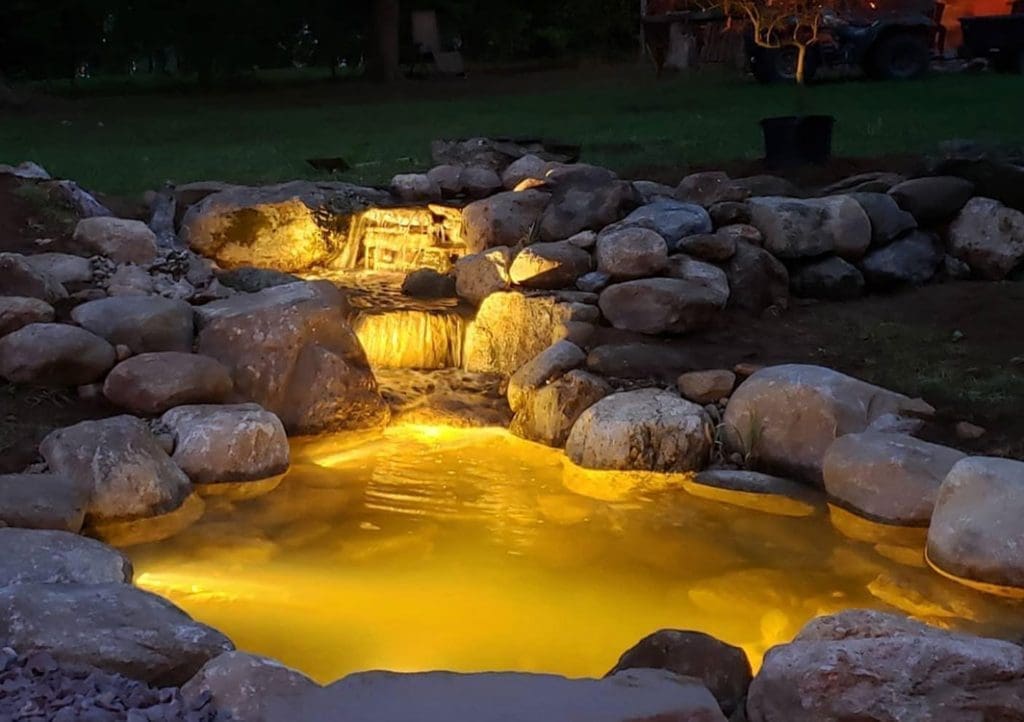As a pond owner, it’s important to take extra care of your aquatic friends during the winter months. Cold temperatures and shorter days can be hard on pond fish, so it’s important to follow these tips to ensure their health and well-being.
Keep the Pond Ice-Free
One of the most important things to do for your pond in the winter is to keep it from freezing over completely. While a thin layer of ice is natural and can actually insulate the water to some degree, a solid layer of ice can block out sunlight and oxygen, leading to the death of plants and fish.
To keep your pond from freezing over, there are a few options you can try:
Use a pond heater or deicer to keep a small area of the pond open. These devices are specifically designed to keep a hole in the ice, allowing oxygen to circulate and preventing the water from becoming stagnant.
Use a floating pond cover or inflatable pond protector to insulate the surface of the water. These covers can help to keep the water temperature stable and prevent ice from forming.
Add a small fountain or aerator to your pond. The movement of the water can help to prevent ice from forming, and the oxygen produced by the fountain will help to keep your fish healthy.
Keep Your Fish Well-Fed
Pond fish have a lower metabolism in the winter, which means they don’t need to eat as much. However, it’s still important to provide them with a high-quality, protein-rich diet to keep them healthy.
We recommend using a specialized winter fish food that is lower in protein and easier for the fish to digest. These types of foods will help to keep your fish from getting overweight, which can be a problem in the colder months.
It’s also a good idea to feed your fish smaller, more frequent meals rather than one or two large ones. This will help to keep their metabolism up and ensure they’re getting the nutrients they need.
Keep Your Pond Clean
Even though your pond may not be as active in the winter, it’s still important to keep it clean. Dead leaves and other debris can accumulate in the water, leading to poor water quality and an increased risk of disease.
We recommend performing a thorough cleaning of your pond before the water starts to freeze. This will give you a chance to remove any debris and ensure the water is as healthy as possible for your fish.
If you’re unable to clean your pond before it freezes, try using a pond vacuum to remove debris once the water thaws in the spring.
Keep an Eye on Your Fish
As the temperatures drop, it’s important to keep an eye on your fish to ensure they’re healthy. Look for signs of stress, such as lethargy or changes in color, as these can be indicators of problems.
If you notice any changes in your fish’s behavior, it’s important to take action as soon as possible. This could mean providing additional heating or oxygen, or even treating the water for illness.
Protect Your Pond from Predators
In addition to the cold weather, pond fish also have to deal with predators during the winter months. Birds, such as herons, may be more likely to prey on your fish when other food sources are scarce.
To protect your fish from predators, you can try the following:
Use a pond net to cover the surface of the water. This will create a physical barrier that birds can’t penetrate.
Install a pond predator deterrent, such as a noise maker or water sprayer. These devices can help to scare off birds and other predators.
Add some floating plants to your pond. The added cover can provide your fish with a place to hide and make it more difficult for predators to spot them.
Avoid Overcrowding
When the weather is cold, it’s natural to want to keep your fish together in a smaller space where they can stay warm. However, overcrowding can lead to problems such as poor water quality and an increased risk of disease.
To avoid overcrowding, it’s important to ensure your pond is large enough to accommodate your fish comfortably. This will allow them to have enough space to swim and explore, even in the colder months.
If you’re unable to provide your fish with a larger pond, consider providing additional heating or oxygen to help create a more comfortable environment.
Consider Moving Your Fish Indoors
In extreme cases, it may be necessary to move your fish indoors for the winter. This can be a good option if your pond is prone to freezing over or if the weather is particularly harsh.
To move your fish indoors, you’ll need to set up a temporary tank or pond in a heated space, such as a garage or basement. Be sure to provide your fish with a high-quality diet and maintain proper water quality to ensure their health and well-being.
Remember to acclimate your fish slowly to any changes in temperature or water quality to avoid stress. With a little bit of planning, you can help your fish survive the winter in good health.
By following these winter pond and fish care tips, you can help to ensure the health and well-being of your aquatic friends during the colder months. With proper care, your pond can be a thriving ecosystem all year round.




